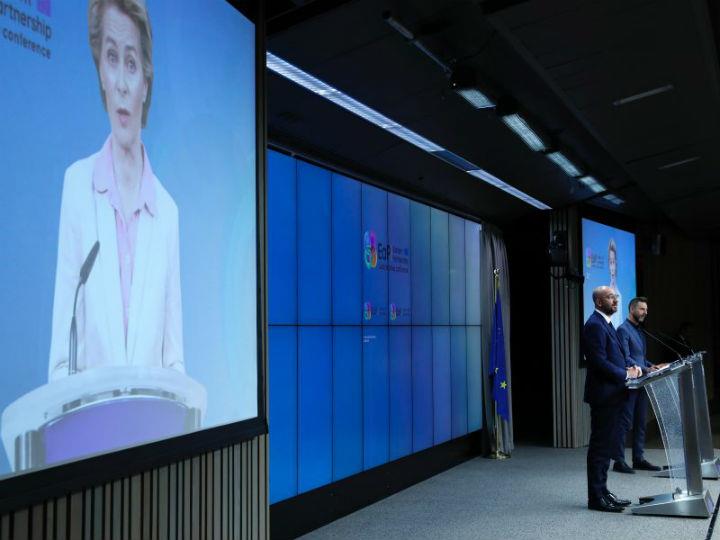by Beatriz Rios
Pressure is mounting on EU leaders to get over their differences as they meet on Friday (17 July) in person for the first time since the start of the coronavirus outbreak to close a deal on an unprecedented stimulus package to tackle the socio-economic fallout of the crisis.
EU heads of states and governments are meeting on Friday and Saturday in Brussels to negotiate a €1 trillion budget for the next seven years and a €750 billion recovery fund.
The meeting will take place in the biggest room of the Europa Building, the Brussels headquarters of the European Council, in order to guarantee social distancing between participants and with reduced delegations assisting them in the negotiation.
Bilateral contacts between leaders and European Council president Charles Michel have intensified over the past weeks on the basis of an updated proposal put forward by the former Belgian prime minister.
But in spite of attempts to find a compromise, positions are still far apart.
“We are not there yet, an agreement is not guaranteed, on the contrary, there are still important differences,” an EU official said, explaining that the meeting will start with a first round of interventions on the basis of which Michel could come up with a new text.
The size and the tools
Michel’s updated budget proposal totals €1,074 billion for 2021-2027, lower than the €1,100 billion initially put forward by the European Commission. However, a newsletter sent by the president on Thursday (16 July) created some confusion, as it referred to “a plan of an exceptional nature and size: a plan to the sum of €1,750 billion.”
EU officials were unable to clarify whether this was an honest mistake or a last-minute decision by the president to adjust his proposal in order to please the so-called ‘frugal’ member states – Austria, Denmark, Sweden, and potentially Finland – who have demanded cuts to the budget long before the health crisis erupted.
Meanwhile, most EU member states seem comfortable enough with the revised €1,074 billion proposal, as long as the €750 billion recovery fund is preserved. This is the case in particular of Southern countries, who are keen on a more ambitious budget.
The proposed €750 billion recovery fund is not only historic due to its size but also because of its architecture: for the first time – and with Germany’s blessing – the European Commission proposed to create a joint pot by borrowing from the markets to issue common debt using the EU budget as a guarantee.
The frugals would like to see the size reduced as much as possible, but Spain, Italy, France and Portugal will fight to preserve the firepower of the instrument.
The share of grants – direct transfers to hard-hit countries – and loans are another controversial issue. Out of the €750 billion, €500 billion would be transferred in the form of grants if the Commission proposal is preserved. However, the Netherlands and Sweden are pushing for the money to come in the form of loans at favourable terms.
The governance
While the architecture of the fund is highly controversial, all member states agree on the need to create a new instrument because of the unprecedented crisis. According to the latest Commission forecast, the EU economy is expected to shrink by 8.3% this year, causing the deepest recession Europe has experienced since the Second World War.
However, the Hague argues that extraordinary solutions require extraordinary governance and has requested oversight over how the funds are used: EU money will be subject to conditions such as greening the economy, upholding democratic principles and the rule of law but also ensuring structural reforms to make countries more resilient to economic shocks.
The key for The Hague is to ensure that those principles are observed. To obtain EU recovery funding, countries will be asked to submit detailed national “recovery and resilience plans” on the basis of country-specific recommendations made by the Commission during the so-called “semester” of EU economic policy coordination.
However, the Council will have the last word over the approval of national blueprints. While Michel has proposed a qualified majority to do so, the Netherlands wants unanimity and better oversight to make sure countries pursue the agreed reforms. Meanwhile, countries like Spain say a reversed qualified majority should be needed in order to reject a national plan.
Three potential vetoes
The political difficulty of the package is that agreement requires unanimity and a ratification process according to national constitutions: potential vetoes to an agreement could, therefore, come straight from Budapest, Warsaw, The Hague or any other EU capital.
On Tuesday, Hungary’s Viktor Orban secured a parliamentary mandate to reject an agreement that would condition EU money to the respect of the rule of law.
Warsaw, for its part, has refused to implement an EU-wide target to achieve climate neutrality by 2050, and said it would reject green conditions to access EU recovery funds. Other countries, such as Estonia or Czechia would probably also share the same views.
Poland was meant to reassess its position on the 2050 climate goal at an EU summit in June, but the pandemic changed the Council’s agenda. Officials have warned that EU funds would only be accessible for countries that accept the climate neutrality goal, which puts the issue de facto back on the agenda.
Meanwhile, governance is key for The Hague who wants a unanimity vote on how common debt is used and does not care whether it is alone on this: “Numbers doesn’t matter because it is an issue for us.”
Nothing is agreed until everything is agreed, an EU source acknowledged saying some important problems remain with a number of national delegations. However, the same official said he was not pessimistic, adding an agreement was possible before the summer break.
*first pulished in: www.euractiv.com




 By: N. Peter Kramer
By: N. Peter Kramer
